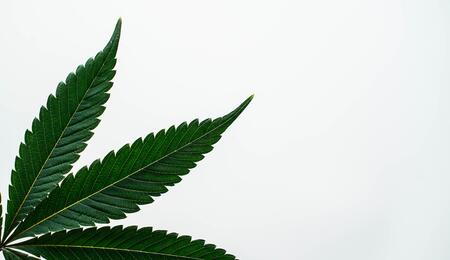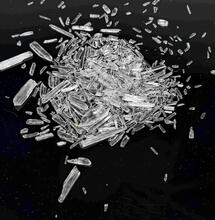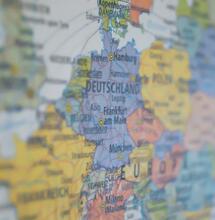Marijuana & Hemp: History, Uses, Laws and Controversy

As the title suggests, this is not a light read. However, John McCabe's latest volume presents an easy to comprehend, yet difficult to put down text that spotlights the positive environmental impact of growing hemp, and how not being able to legally do so is putting US industries behind those around the world, yet again.
If this book or its contents appear familiar to you, perhaps it's because you might have already read Hemp: What the World Needs Now (2010) by the same author. This new, seemingly unabridged version includes, by McCabe's own admission, even the material that the publishers had attempted to convince him to redact. The result is over 500 pages of observations regarding the botanical- cultural- and legal history of hemp, as well as its current state (or lack thereof) in America, what we should do to help and the ecological benefits of hemp farming.
The tone of McCabe's book definitely lends itself to a wide audience; usually these topical tomes are beloved and praised by those 'in the know', while being overlooked by those who don't know much at all - or flatly refuse to inform themselves. Due to the stigma that still plagues the industry in the US, combined with the ignorant and often ridiculous Federal attitudes towards hemp, it's no wonder that in 2011, US farmers are still prevented from legally cultivating a plant that has thrived for over 10,000 years on this planet.
The title may actually mislead potential readers, as the book takes a decidedly hemp-centric approach. Marijuana & Hemp dispels many myths to which our beloved plant has been subjected over the years; namely, the idea that cultivation of hemp would somehow be linked to the drug trade is an absurd and damaging leap. Absurd because, as any grower knows, recreational- and medical users only employ the effects of (female) smoke-able Cannabis flowers, to which many refer as 'marijuana'. 'Hemp' actually encompasses all those plants that produce non-psychoactive flowers, meaning that not only will they not get the user 'high'; rather, the plants of this type are full of the cannabinoid CBD (cannabidiol), which functions as a sort of anti-THC and effectively kills off any enjoyable buzz - leaving the smoker with a nasty headache.
Hemp farmers everywhere are actually a scourge to outdoor marijuana growers, as the ganja flowers would be cross-pollinated by the low-THC hemp males. In short, hemp would destroy all the fun effects that pot smokers pursue when lighting up, enraging the local weed growers. The reason this fact is important is because the Feds and the DEA have, for years, continually argued against hemp farming in America, claiming that hemp fields would be the perfect place for weed growers to hide their illicit crops - and implying that all (hemp) farmers would willingly play a complicit role in the drug trade.
“In 2011, US farmers are still prevented from legally cultivating a plant that has thrived for over 10,000 years on this planet„
In fact, mass-cultivation of industrial hemp could potentially revolutionize the textile industry, not to mention offsetting some of the environmental damage caused by mining, deforestation, cotton farming and mono-cropping. Hemp helps to prevent erosion and mudslides, aerates the soil, minimizes insect infestation as a border crop, prevents insect habitation in the soil - and even processes several times more CO2 than many other plants, exhaling oxygen for all of us to breathe. Hemp fuels are less damaging to the environment, regarding both production and emissions, than petroleum-based products. The burning of hemp fuels does not contribute to the already high acid levels in the world's oceans, and the processing of hemp ethanol does not require the tons of coal and other fossil fuels currently employed to extract, for example, corn ethanol. If US farmers were legally able to grow hemp on their own lands, the entire production cycle would benefit them, on their own premises - right down to the lack of purchasing and transporting fuel for their machinery.
“Hemp farmers are a scourge to outdoor marijuana growers, as the ganja flowers would be cross-pollinated by the low-THC hemp males„ McCabe reminds us that alternative fuel crops such as soy and corn are actually quite damaging to the environment, partially due to the copious amounts of energy and fertilizer needed to grow the plants, but also because of the damage these crops do to farmland, stripping away nutrients and sometimes leading to deforestation. Hemp can actually heal the land on which it's farmed, and improve the air quality for those living in its environs. “The burning of hemp fuels does not contribute to the already high acid levels in the world's oceans„ It's obvious that McCabe is not simply a hemp activist; rather, he is a planet activist. Other avenues of ecological relief are explored in the book, including solar power and the incredible untapped fuel potential of substances such as lawn clippings and industrial food waste - cluttering landfills nationwide.
Regardless of the slightly rough delivery, this book presents a wide-ranging source of true hemp facts, warnings about dwindling US resources and dozens of helpful contacts throughout the hemp industry, so that you can begin networking on your own. One negative regarding the format and length is that McCabe occasionally repeats himself, beyond attempting to drive home certain points. Another downside is that true hemp experts will find a few flaws in some of McCabe's research (and not just because of the occasionally incorrectly attributed/-dated art work), including the oft-misreported fact that most hemp biodiesel is made from the woody hurds of the hemp stalk, not the seeds (food oil is extracted from hemp seeds).
A strong editor would make this text exceptional, and slightly easier to navigate. However, the index is incredibly detailed and helpful, and will likely inspire you to continue to educate yourself as to how hemp truly is our future. Perhaps the best result of this text is the countless hours of debate it will spark. In order to progress, achieve and survive, we as humans must constantly re-invent ourselves. As with so many other facets of our history on this planet, learning from our mistakes often, unfortunately, involves repeating them. If we take the lessons in McCabe's book as examples, perhaps we can actually thrive by recreating old hemp technologies and applications into new innovations. In order to succeed, we first need to legalize hemp cultivation in the US.
Contact the author: www.ignitingyourlife.com John McCabe c/o Carmania Books P.O. Box 1272 Santa Monica, CA 90406 USA ISBN: 978-1-884702-01-3



